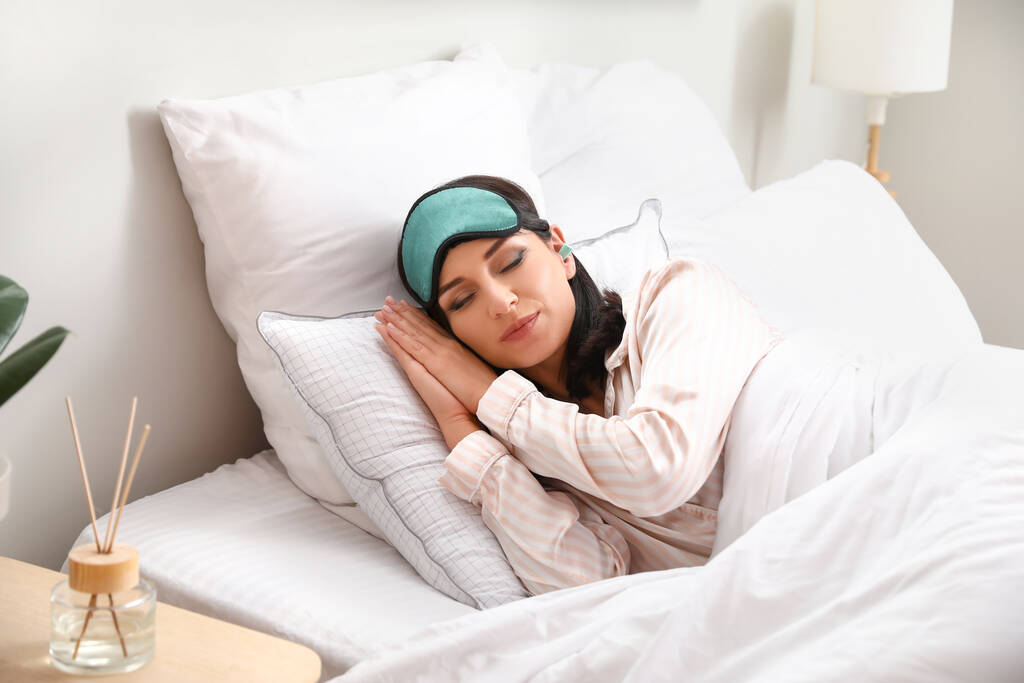Sleep Hygiene: Sleep Aid Explained
September 13, 2023

Welcome, dear reader, to the magical world of sleep hygiene! This isn't about brushing your teeth before bed, oh no, it's far more enchanting. It's about creating the perfect environment and habits to whisk you off to the land of dreams with ease. So, put on your pajamas, grab a cup of chamomile tea, and let's dive into the depths of sleep hygiene, the most delightful of all sleep aids.
Now, you might be wondering, "What exactly is sleep hygiene?" Well, my friend, you're about to embark on a journey of discovery. You'll learn the secrets of the sleep world, and by the end, you'll be a veritable sleep wizard, capable of conjuring up a good night's rest with a mere snap of your fingers. So, without further ado, let's get started!

The Definition of Sleep Hygiene
Let's start at the very beginning, a very good place to start. Sleep hygiene, in its simplest form, is a variety of different practices and habits that are necessary to have good nighttime sleep quality and full daytime alertness. Think of it as a recipe for the perfect sleep. Just like baking a cake, you need the right ingredients in the right amounts to get the best results.
But it's not just about the quantity of sleep, oh no. It's about the quality too. You could sleep for 12 hours and still wake up feeling like you've been hit by a truck if your sleep hygiene isn't up to scratch. So, it's important to get this right. After all, who doesn't want to wake up feeling refreshed, rejuvenated, and ready to seize the day?
The Importance of Sleep Hygiene
Now, you might be thinking, "Why should I care about sleep hygiene?" Well, dear reader, the answer is simple. Good sleep hygiene can significantly improve your quality of life. It can boost your mood, increase your productivity, and even improve your health. Yes, you heard that right. Good sleep hygiene is a magic potion for a happier, healthier life.
On the flip side, poor sleep hygiene can lead to a host of problems. It can make you feel groggy, grumpy, and generally out of sorts. It can also lead to more serious health issues like obesity, heart disease, and diabetes. So, it's not something to be taken lightly. It's a crucial part of your overall health and well-being.
The Elements of Sleep Hygiene
So, what are the ingredients in this magical sleep potion? Well, there are several key elements to good sleep hygiene. These include things like your sleep environment, your bedtime routine, and your lifestyle habits. Each of these elements plays a crucial role in determining the quality and quantity of your sleep.
Let's start with your sleep environment. This is all about creating a space that is conducive to sleep. It should be dark, quiet, and cool. Your bed should be comfortable, and your bedroom should be free from distractions. Think of it as your personal sleep sanctuary, a place where you can escape from the world and drift off into dreamland.
Your Sleep Environment
Your sleep environment is like the stage for your nightly performance of sleep. It needs to be set just right to ensure a stellar performance. This includes factors like light, noise, and temperature. Too much light can interfere with your body's production of melatonin, a hormone that helps regulate sleep. Noise can jolt you out of your slumber, and an overly warm room can make it difficult to fall asleep and stay asleep.
So, how can you create the perfect sleep environment? Start by making your bedroom as dark as possible. Use blackout curtains or an eye mask if necessary. Keep noise to a minimum by using earplugs or a white noise machine. And try to keep your bedroom cool, ideally between 60 and 67 degrees Fahrenheit. Remember, your bedroom is your sleep sanctuary. Treat it with the respect it deserves.
Your Bedtime Routine
Next up is your bedtime routine. This is all about creating a series of habits that signal to your body that it's time to sleep. This could include things like reading a book, taking a warm bath, or practicing some gentle yoga. The key is consistency. By doing the same things each night, you're training your body to associate these activities with sleep.
But it's not just about what you do before bed. It's also about when you do it. Try to go to bed and wake up at the same time every day, even on weekends. This helps to regulate your body's internal clock, making it easier to fall asleep and wake up in the morning. Remember, consistency is king when it comes to sleep hygiene.
The Role of Lifestyle Habits
Now, let's talk about lifestyle habits. These are the things you do during the day that can affect your sleep at night. Things like diet, exercise, and exposure to light can all play a role in how well you sleep. For example, consuming caffeine or alcohol close to bedtime can interfere with your sleep. Similarly, spending too much time indoors and not getting enough natural light can throw off your body's internal clock.
So, what can you do to improve your lifestyle habits? Start by paying attention to what you eat and drink. Try to limit your intake of caffeine and alcohol, especially in the hours leading up to bedtime. Get regular exercise, but try to finish your workout at least a few hours before bed. And try to spend some time outside each day, soaking up that natural light. Remember, good sleep hygiene is a 24-hour job.
Common Sleep Hygiene Mistakes
Now that we've covered the basics of sleep hygiene, let's talk about some common mistakes. These are the things that many people do, often without realizing it, that can sabotage their sleep. Things like using electronic devices before bed, napping during the day, and eating or drinking too close to bedtime.
The good news is, once you're aware of these mistakes, they're relatively easy to fix. So, let's take a closer look at each one, and discuss some strategies for avoiding them.
Using Electronic Devices Before Bed
Many of us are guilty of this one. Whether it's checking your email one last time, scrolling through social media, or watching a movie, using electronic devices before bed can interfere with your sleep. The blue light emitted by these devices can suppress your body's production of melatonin, making it harder to fall asleep.
So, what can you do? Try to establish a "digital curfew" at least an hour before bed. Use this time to unwind and prepare for sleep. If you absolutely must use your devices, consider using a blue light filter or wearing blue light blocking glasses.
Napping During the Day
Napping during the day can be a double-edged sword. On one hand, a short power nap can help to boost your energy and improve your mood. On the other hand, long or late-day naps can interfere with your sleep at night.
So, if you're a fan of naps, try to keep them short and early in the day. A 20-minute power nap in the early afternoon can be a great way to recharge without disrupting your nighttime sleep.
Improving Your Sleep Hygiene
Now that you're armed with all this knowledge about sleep hygiene, it's time to put it into practice. Remember, improving your sleep hygiene is a journey, not a destination. It's about making small, sustainable changes to your habits and environment. So, don't try to overhaul your entire routine in one go. Start small, and build from there.
And remember, everyone is different. What works for one person might not work for another. So, don't be afraid to experiment and find what works best for you. After all, you're the star of your own sleep show. So, take the reins and create the perfect sleep routine for you.

Conclusion
And there you have it, dear reader. A comprehensive guide to sleep hygiene, the most delightful of all sleep aids. We've covered everything from the definition of sleep hygiene, to the elements of good sleep hygiene, to common mistakes and how to avoid them. Now, it's over to you. It's time to take this knowledge and use it to conjure up the best sleep of your life.
So, as you embark on this journey of sleep discovery, remember to be patient with yourself. Change takes time. But with a little perseverance, and a sprinkle of sleep magic, you'll be well on your way to a better night's sleep. So, here's to sweet dreams and restful nights. Sleep well, dear reader, and goodnight.

 Back to Blog
Back to Blog